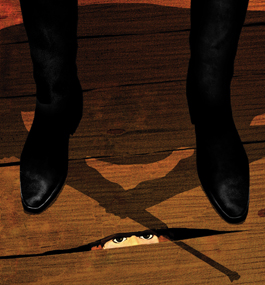Turning Points
A Hidden Child

Brian Stauffer
by Susan Gold ’56
Imagine spending two years under a barn, rarely seeing any light, confused and frightened, denied almost all contact with the outside world.
That’s how I lived from 1942-44. More than a million children were murdered in the Holocaust. Those who survived did so because they were kept out of sight, in a convent, an orphanage or a sewer, for instance. These were the “hidden children.” I am one of them. I survived in a bunker on a farm in western Ukraine during the time of Judenrein, the ethnic cleansing of Jews through deportation or murder.
Some surviving children, most of them too young to know what was happening, were lucky enough to be taken away from their parents, perhaps to be brought up by a Christian family. Some of these children were treated with love. Some were made to serve as domestic help and abused. The luckiest ones reunited with their parents after the war.
I was one of the relatively small number of children who hid with their parents. It was a grim and out-of-time experience. We received very little kindness from the people who protected us. Each day, one bucket of food came down, and one bucket of waste went back up. I remember Nazi boots stomping on the barn floor overhead; my father would put a pillow over my head so I couldn’t make a sound. Occasionally, the farmer’s wife would take me upstairs to glimpse daylight through the cracks in the barn wall.
The farm family who saved us were “righteous” Christians, but they had an agenda. Our agreement was that they would hide us if we gave them five gold pieces each month. In their small village, everyone knew everyone else’s business, so they couldn’t spend this money, because evidence of new wealth might arouse suspicion and cause the Nazis to investigate.
As the war dragged on, the farmers became more frantic — the penalty for harboring Jews was death. They decided to kill us themselves. We learned about their plan months later, when they told us about it after getting drunk at a party that celebrated our liberation and their freedom from the fear that came with hiding Jews. I always wondered about their plan. They talked about killing my parents but not about killing me. What would they have done with me?
I was luckier than my little brother, Janek, who was a toddler when we went into hiding. Because he might have cried in the bunker, imperiling all of us, my grandmother took him away to a “safer” place. Soon they were both murdered.
My childhood was lost, wiped out, in Poland and Ukraine. I recall only places of evil, places I endured. The ruins of Holocaust survivors are unlike those of any others. The best example of a monument to our grief is at the Janowska site, near the city of Lviv. This memorial depicts a woman reading to a child whose head has been cut off.
More than half a century passed before I was able to tell the story of my devastating childhood. Only after raising my own family did I feel secure enough to cope with the past and write about it in my memoir, “The Eyes Are the Same.”
The lives of hidden children hold many harrowing tales. We are now the oldest survivors of the Holocaust, and our own days are limited. As time goes by, it often becomes more difficult for us to reckon with the chaos, carnage and murder we witnessed. Often, only remnants of our happier prewar experiences remain.
Many historians, literary critics and psychologists have written about voluntary memory. I have found I navigate two rivers, memory and history, simultaneously. For me, they are not separate but fluid, intertwined.
The task of remembering makes all of us our own historians. Hidden children are keepers of history and memory. But we also have another responsibility. We must impart a legacy, the shared collective memory of whole communities that are no more.
Susan Gold is a facilitator of the Hidden Child Book Club at Temple Emanu-El in New York City. She edited “The Hidden Child Book Club Remembers: An Anthology of Holocaust Stories” (Full Court Press, 2016), from which this essay is adapted. She can be reached at gaga1999@aol.com.
